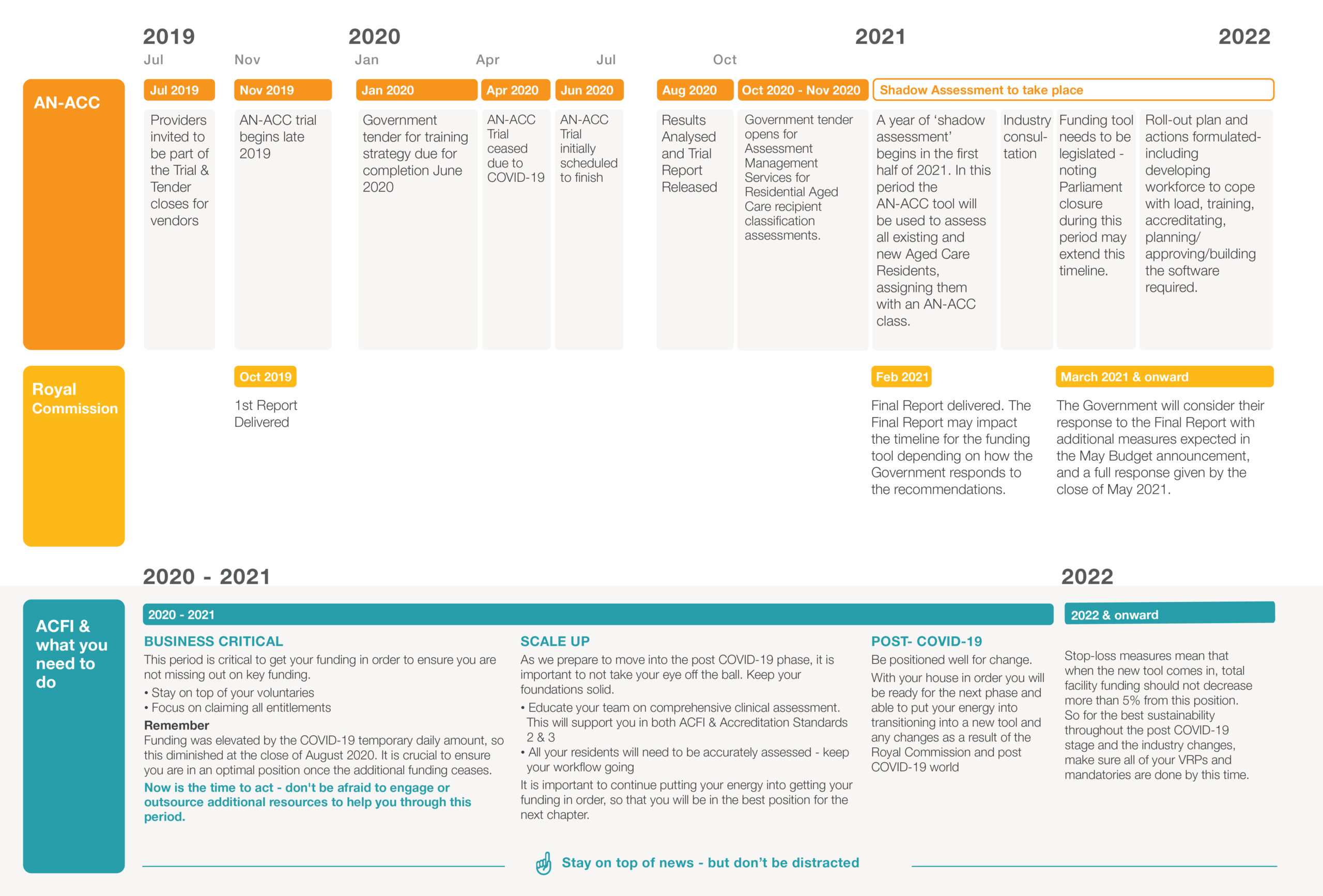In this article we are going to bust through some of the myths we are hearing, lay out the facts, update on the progression to a new tool and let you know what you need to do to prepare.
MYTHS WE’RE BUSTING:
- FALSE: The Australian National Aged Care Classification (AN-ACC) is confirmed as the new funding tool
- FALSE: ACFI is dead in 2021
- FALSE: There is no reason to focus on ACFI or continue to learn about it
It has been a huge year for Aged Care, with a great deal of challenges and change. Amongst the multitude of subjects the industry has dealt with this year, there continues to be discussion, confusion and speculation about the proposed timeline of the dissolution of ACFI, and the transition to its replacement.
Whilst there have been movements and updates in the project to transition to a new funding tool, the chatter has left much of the industry in limbo, lending to the perception that we no longer need to focus on ACFI and ignoring how important it still is to the sustainability of Aged Care Organisations.
HAS AN-ACC BEEN CONFIRMED BY THE GOVERNMENT AS THE NEW TOOL?
FACT: NO – ACFI IS STILL THE FUNDING MODEL until (at very least) 2022
Despite the AN-ACC Shadow Assessment taking place in 2021, ACFI will continue to be the funding tool used for the entirety of 2021. The Shadow Assessment period is scheduled to run until February 2022 (with a potential extension to June 2022).
Once the trial has been completed:
- The results of the shadow assessment and the proposed funding tool will need to be analysed
- A decision will need to be made by Government on if they intend to implement the AN-ACC funding model, or another funding model, with further consultation with consumers and the industry
- Once the funding model has been determined and no further changes are required, it will need to be legislated
- A roll out plan will need to be developed, including a workforce plan and training of this workforce to become credentialled assessors
- The Government will also need to update infrastructure and IT systems.
Other factors that can influence the timeline are:
- Findings from the Royal Commission recommendations will need to be considered and the formal response provided on the funding recommendation(s).
- A change in Government
- The uncertainty around current and future impacts of COVID-19
The Government has explicitly stated that if the AN-ACC model is the chosen tool for funding reform, funding would only be paid using this model from 2022. With the AN-ACC Assessment trial set to end in February 2022 at the earliest, and the above factors, it is understandable that a lot of work is still to be done before this can occur.
You can read the Government’s information on the Aged Care Funding Reform page here.
BUT ISN’T AN-ACC BEING IMPLEMENTED IN 2021?
FACT: NO – THE AN-ACC IS STILL IN TRIAL PHASE UNTIL 2022, AND NO FINAL DECISIONS TO IMPLEMENT IT HAVE BEEN MADE
Whilst the AN-ACC trial has progressed and the Royal Commission’s Final Report makes a recommendation for funding via a casemix classification system (such as AN-ACC) there has still been no confirmation that the tool will be implemented. .
Let’s take a look at the trial.
What has happened so far?
- The AN-ACC assessment trial, that had been underway since late 2019 and scheduled to be completed in June 2020 was put on hold in March 2020 as a result of the COVID-19 outbreak.
- Originally slated to be on hold for at least 6 months, the trial was ceased from early April 2020 and the trial report released on the data that had been collected up to this point, which was made up of:
- 7387 AN-ACC assessments completed across 122 homes of which:
- 7276 permanent residents
- 111 respite residents
- The trial of the AN-ACC assessment framework concluded that it was fit for purpose, and assessments could be completed by an external workforce. You can read the Report on the AN-ACC trial here.
What is happening next?
- The next step in the funding reform project will be a ‘Shadow Assessment’ period, which will involve a year of the AN-ACC tool being used to assess, and an AN-ACC class assigned, to all existing and new Aged Care Residents.
- A call for tenders for independent assessors to conduct the assessments closed in November 2020
- The proposed Shadow Assessment period will run from March 2021 to February 2022 (and a possible extension to June 2022 if deemed necessary).
- As a Shadow Assessment, it will run alongside the current ACFI funding tool, with all funding still via ACFI for 2021.
While there has been movement occurring in this space, it is important to note that the Government has not confirmed an implementation of the proposed funding model, and will continue to undertake consultation with both consumers and the industry.
SO THEN…Should I stop focusing on ACFI and try to save costs to get ready for the new tool?
FACT: YOU’RE MAD! THIS PERIOD IS CRITICAL TO GET YOUR ACFI FUNDING IN ORDER
Now is the time focus on ACFI!
Although we know that a new funding tool will eventually replace ACFI, MyVitals tells us on average organisations are underclaiming approximately $1 million per annum. So it is important to utilise the time whilst the AN-ACC is being trialled to get your house in order so that you are in the best possible position going into a new funding tool. That means claiming all your entitled ACFI now, and right up until the new tool is introduced.
Particularly in the post COVID-19 world, with the impact of additional costs and temporary subsidies diminishing, it is crucial to get your funding in order, so that you will be in the best position for the next chapter.
Next steps:
- It is critical to get your funding in order to ensure you are not missing out on key funding in this period.
- Be well positioned for change: with your funding in order, you will be ready for the next phase and can put your energy into transitioning to a new tool, and keeping up with any changes as the result of the Royal Commission
- With stop loss measures, facility funding should not decrease more than 5% when the new tool comes in. To ensure sustainability, the better shape you’re in now, the better shape you’ll be in through the transition. Maintaining a solid ACFI function and completing all necessary voluntary reappraisals and mandatories prior to the transition will be key.
So as you can see, this continues to be no overnight change, and to say that ACFI is no longer important to learn about does not ensure a smooth or sustainable transition.
Below is our estimated timeline on the changes that a new tool, the Royal Commission and the post-COVID world will bring, based on the information we currently have. Click on the image to zoom in!

 |
The Provider Assist Team Author |




